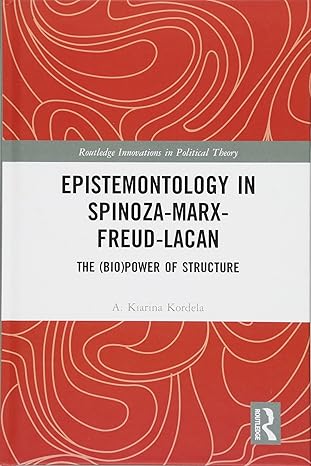 Epistemontology in Spinoza-Marx-Freud-Lacan: The (Bio)Power of Structure (Routledge Innovations in Political Theory)
Epistemontology in Spinoza-Marx-Freud-Lacan: The (Bio)Power of Structure (Routledge Innovations in Political Theory)
by: A. Kiarina Kordela (Author)
Publisher:Routledge
Edition:1st
Publication Date: October 3, 2017
Language:English
Print Length:218 pages
ISBN-10:9781138068353
ISBN-13:9781138068353
Book Description
A. Kiarina Kordela steps beyond extant commentaries on Marx’s theory of commodity fetishism―from A. Sohn-Rethel to L. Althusser, É. Balibar, Slavoj Žižek, and others―to show that in capitalism value is the manifestation of the homology between thought and being, while their other aspect―power―is foreclosed and becomes the object of biopower. Using monistic Marxian/Lacanian structuralism as an alternative to dominant models from Plato and Kant to phenomenological accounts, deconstruction, and other contemporary approaches, Kordela expertly argues that Marx’s theory of commodity fetishism is a reformulation of the Spinozian thesis that thought (mind) and things (bodies or extension) are manifestations of one and the same being or substance. Kordela’s link between Spinoza and Marx shows that being consists of two aspects, value and power, the former leading to structuralist thought, the latter becoming the object of contemporary biopower. Epistemontology in Spinoza-Marx-Freud-Lacan intervenes between two dominant lines of thought in the reception of Marx today: on the one hand, an approach that relates Marxian thought to psychoanalysis from a Hegelian/dialectical perspective and, on the other hand, an approach that links Marxism to Spinozian monism, at the total exclusion of psychoanalysis.This book will interest scholars and researchers who study Marxism, (post)structuralism, psychoanalysis, critical theory, ontology, epistemology and theories of representation, theoreticians of cultural studies and comparative literature, aesthetic theory, including the relation of art to economy and politics, and biopolitics.
About the Author
A. Kiarina Kordela steps beyond extant commentaries on Marx’s theory of commodity fetishism―from A. Sohn-Rethel to L. Althusser, É. Balibar, Slavoj Žižek, and others―to show that in capitalism value is the manifestation of the homology between thought and being, while their other aspect―power―is foreclosed and becomes the object of biopower. Using monistic Marxian/Lacanian structuralism as an alternative to dominant models from Plato and Kant to phenomenological accounts, deconstruction, and other contemporary approaches, Kordela expertly argues that Marx’s theory of commodity fetishism is a reformulation of the Spinozian thesis that thought (mind) and things (bodies or extension) are manifestations of one and the same being or substance. Kordela’s link between Spinoza and Marx shows that being consists of two aspects, value and power, the former leading to structuralist thought, the latter becoming the object of contemporary biopower. Epistemontology in Spinoza-Marx-Freud-Lacan intervenes between two dominant lines of thought in the reception of Marx today: on the one hand, an approach that relates Marxian thought to psychoanalysis from a Hegelian/dialectical perspective and, on the other hand, an approach that links Marxism to Spinozian monism, at the total exclusion of psychoanalysis.This book will interest scholars and researchers who study Marxism, (post)structuralism, psychoanalysis, critical theory, ontology, epistemology and theories of representation, theoreticians of cultural studies and comparative literature, aesthetic theory, including the relation of art to economy and politics, and biopolitics. Read more
未经允许不得转载:电子书百科大全 » Epistemontology in Spinoza-Marx-Freud-Lacan: The (Bio)Power of Structure (Routledge Innovations in Political Theory)

